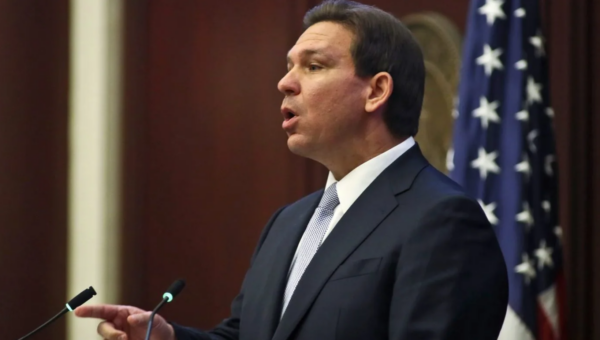Florida Gov. Ron DeSantis (R) signed a six-week abortion restriction into law, which Democrats and some Republicans think might hurt his 2024 White House bid.
After the Republican-controlled House approved the proposal, DeSantis signed it. DeSantis gained favor with anti-abortion groups and extreme conservatives, who will likely decide the GOP’s 2024 presidential nominee.
In the months since the Supreme Court overturned Roe v. Wade, the 1973 ruling that defined abortion rights in the U.S., a wider swath of the electorate has repeatedly rejected rigid new abortion restrictions, which could hurt DeSantis politically.
“I can’t understand DeSantis’ political calculus here,” said Florida state House Democrats spokesperson Jackson Peel. This ball beat him. This loses him the primary or general.”
While DeSantis heralded the act as a success for the anti-abortion rights movement, there was evidence that the Florida governor is aware of how difficult abortion politics have become for the GOP.

After hailing the Supreme Court’s Roe v. Wade overturn last summer, he mostly stayed silent, promising to “expand pro-life protections.” Though he had promised to sign the six-week ban, he did so quietly Thursday night.
“We are proud to support life and family in Florida,” he stated. “I applaud the Legislature for passing the Heartbeat Protection Act that expands pro-life protections and provides additional resources for young mothers and families.”
In last year’s midterm elections, Democrats campaigned on protecting abortion rights and blasted Republicans for imposing new restrictions after the Supreme Court’s Dobbs ruling ended national abortion protections, highlighting abortion politics’ precariousness.
“The abortion issue was poorly handled by many Republicans, especially those that firmly insisted on No Exceptions, even in the case of Rape, Incest or Life of the Mother, that lost large numbers of Voters,” former President Trump said after the midterms.
Florida’s new legislation permits abortions up to 15 weeks for mother’s health and rape and incest up to 15 weeks. The state Supreme Court’s ruling on a challenge to last year’s 15-week abortion ban will determine the new law’s implementation.

Republican-led state legislatures have restricted abortion access since the Dobbs ruling, leaving DeSantis and other GOP presidential contenders vulnerable.
“This may not hurt him in the primary, but clearly this puts Republicans in a position they wouldn’t want in a general, and it makes it even harder to define Democrats as extremists on this issue,” Heye said.
“The Dobbs decision made a theoretical issue a practical issue,” he said. “They’re having legislatures, whether in their states or others, putting this issue out front.”
The six-week restriction might help DeSantis woo evangelicals and anti-abortion groups, who remain important in Republican politics, as he prepares for a 2024 presidential candidacy. The Florida abortion restriction may open DeSantis to new attacks in a primary that many Republicans feel should be about choosing the candidate most likely to win in 2024.
One Republican pollster remarked, “This isn’t winning electoral messaging [for DeSantis]. “It’s a given that you tack right to win the primary, but Republican voters are, I think, looking first and foremost at who can win and bring in those voters we lost last time around. Many voters have already declared, “No, we don’t want more abortion bans.”
Former Rep. Carlos Curbelo (R-Fla.), a moderate Republican who lost reelection in 2018, cautioned that the new rule might lose the GOP many suburban women votes it is trying to win back after losing them to Democrats.

Curbelo said Republicans are overreaching on several topics. I’ve been hearing from suburban ladies in Miami that Republicans are going too far on abortion.
2024 Republican presidential aspirant DeSantis is unusual. While Trump and former UN Ambassador Nikki Haley remain on the sidelines, he may actively promote and sign laws as governor.
It puts DeSantis in the middle of a discussion that many other Republican presidential candidates have tried to avoid. Haley said she is “pro-life” but doesn’t “judge anyone who is pro-choice” in Iowa this week, citing the issue’s personal nature.
“This is personal for women and men,” she remarked. “It deserves respect.”
On Friday, Sen. Tim Scott (R-S.C.), who started a presidential exploratory committee this week, told NBC News that he would “sign the most conservative, pro-life legislation that they can get through Congress,” but he did not specify. Trump has avoided the topic.
A veteran Republican strategist, Keith Naughton, said that DeSantis signed the new abortion ban to protect his political standing among conservatives at a time when many Republicans are rallying around Trump after his criminal indictment in New York.
Naughton said the abortion restriction “doesn’t help [DeSantis] in a general,” but the GOP has more than a year to choose its presidential nominee, giving DeSantis time to recover.
Politically, this is defensive. He can probably avoid it for the rest of the campaign since it’s shortly. “He won’t run on it,” Naughton said. DeSantis must win on other topics. He can live if he wins the economy.”
Naughton called it difficult. “I don’t think anyone will get stricter on the issue. He might be able to hold his breath and survive.”

